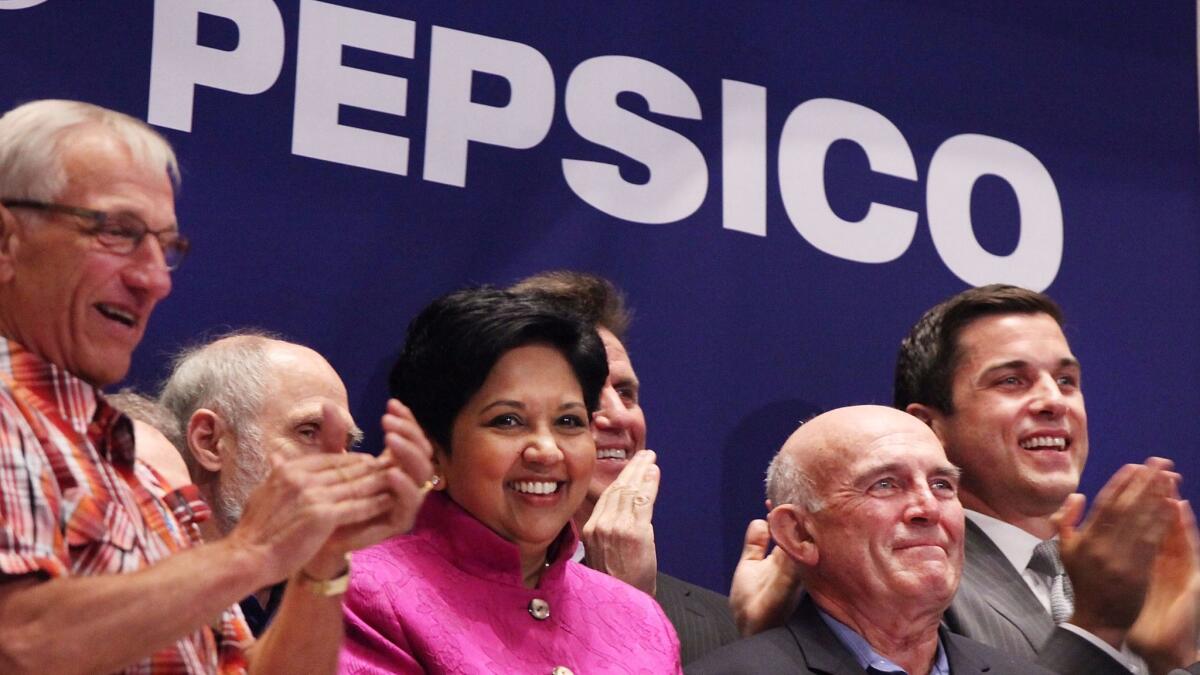How CEOs are responding to Donald Trump’s win

- Share via
Starbucks Chief Executive Howard Schultz may have spoken for many corporate CEOs when he said in a memo to employees that he was “stunned” about the election outcome.
But as the news of Trump’s win gave way to planning for his transition, the reality appears to be taking hold, and corporations are navigating how to respond in the aftermath of a historic election that proved explosively divisive. On the campaign trail, Trump bashed several U.S. companies. Rhetoric about women and minorities from Trump’s campaign, his supporters or his past create a minefield for corporations that have touted their diversity and inclusion policies. Some CEOs or corporate officials who have spoken out have seen calls for boycotts of their brands on social media.
“They’re clearly not as vocal, and in many cases are laying low and waiting to see what really is generated through the Republican-controlled Congress,” says Thomas Cooke, a professor at Georgetown University’s McDonough School of Business.
Yet that Republican-controlled Congress is also expected to usher in pro-business changes such as tax reform, infrastructure plans and regulatory changes that have some in the business community excited, said John Engler, a former governor of Michigan and president of the Business Roundtable, which represents CEOs of the largest public corporations.
“The reaction from the election has simply been ‘Let’s get ready to take advantage of this opportunity that’s presented itself,’ ” Engler said in an interview. CEOs, he says, “are interested in growth. They awakened a week ago and said, ‘Wow, what was not possible is possible.’ ”
In its aftermath, the chief response from CEOs speaking out about the election included congratulations, calls for unity and commitments to diversity. J.P. Morgan CEO Jamie Dimon wrote to his employees that “we have just been through one of the most contentious elections in memory, which can make it even harder to put our differences aside.” Apple’s Tim Cook quoted Dr. Martin Luther King Jr. and reminded employees that “our company is open to all ... regardless of what they look like, where they come from, how they worship or who they love.”
Yet some CEOs are also starting to publicly offer more policy-oriented remarks or even advice for Trump as the focus shifts from the results of the campaign to how he will govern. On Tuesday, General Electric CEO Jeff Immelt, who had written an initial blog post to employees last week, suggested in a CNBC interview that Trump might actually find himself benefiting from trade deals.
“I think what the president will learn,” Immelt said, “is that as he travels the world, trade deals give him power…. If the president of the United States travels around the world and has nothing to offer from a standpoint of economic connection, you lose half of your negotiating power. This guy is a negotiator, he’s a dealmaker. So I think let’s just wait and see what he does.”
Meanwhile, Mark Fields, the CEO of Ford, spoke for the first time since the election outcome about the 35% tariff that Trump has discussed imposing on cars made in Mexico. Fields delivered the keynote speech at the Los Angeles Auto Show on Tuesday and said, “A tariff like that would be imposed on the entire auto sector, and that could have a huge impact on the U.S. economy,” according to the Detroit Free-Press. During the campaign, Trump frequently called out Ford for moving its small car production from the United States to Mexico.
Still, in a charged atmosphere with a divided electorate and an explosive social media environment, some brands are already learning how volatile the response can be to business leaders’ remarks. At the DealBook conference hosted by New York Times columnist Andrew Russ Sorkin last week, PepsiCo CEO Indra Nooyi said she fielded questions from her employees who were “all crying” after the election. She said: “The question that they’re asking, especially those who are not white: ‘Are we safe?’ Women are asking: ‘Are we safe?’ LGBT people are asking: ‘Are we safe?’ I never thought I’d have had to answer those questions.”
Notably, she also spoke of unifying the country and acknowledging the democratic process. Yet Trump supporters on social media platforms seized on parts of her remarks, calling for a boycott of PepsiCo’s products. (A PepsiCo spokesman said in an emailed statement that “Mrs. Nooyi misspoke. She was referring to the reaction of a group of employees she spoke to who were apprehensive about the outcome of the election. She never intended to imply that all employees feel the same way. We are incredibly proud of the diverse views and backgrounds across our workforce, and we are united in our desire for a brighter future.”)
Jena McGregor writes a column analyzing leadership in the news for the Washington Post’s On Leadership section.
ALSO
Trump’s victory could spell the end of the FCC’s net neutrality regulations
Trump used to rail against drug prices. Now the industry’s allies are helping shape his agenda
Why Trump — or any other politician — can’t do much to bring back manual labor jobs
More to Read
Inside the business of entertainment
The Wide Shot brings you news, analysis and insights on everything from streaming wars to production — and what it all means for the future.
You may occasionally receive promotional content from the Los Angeles Times.










